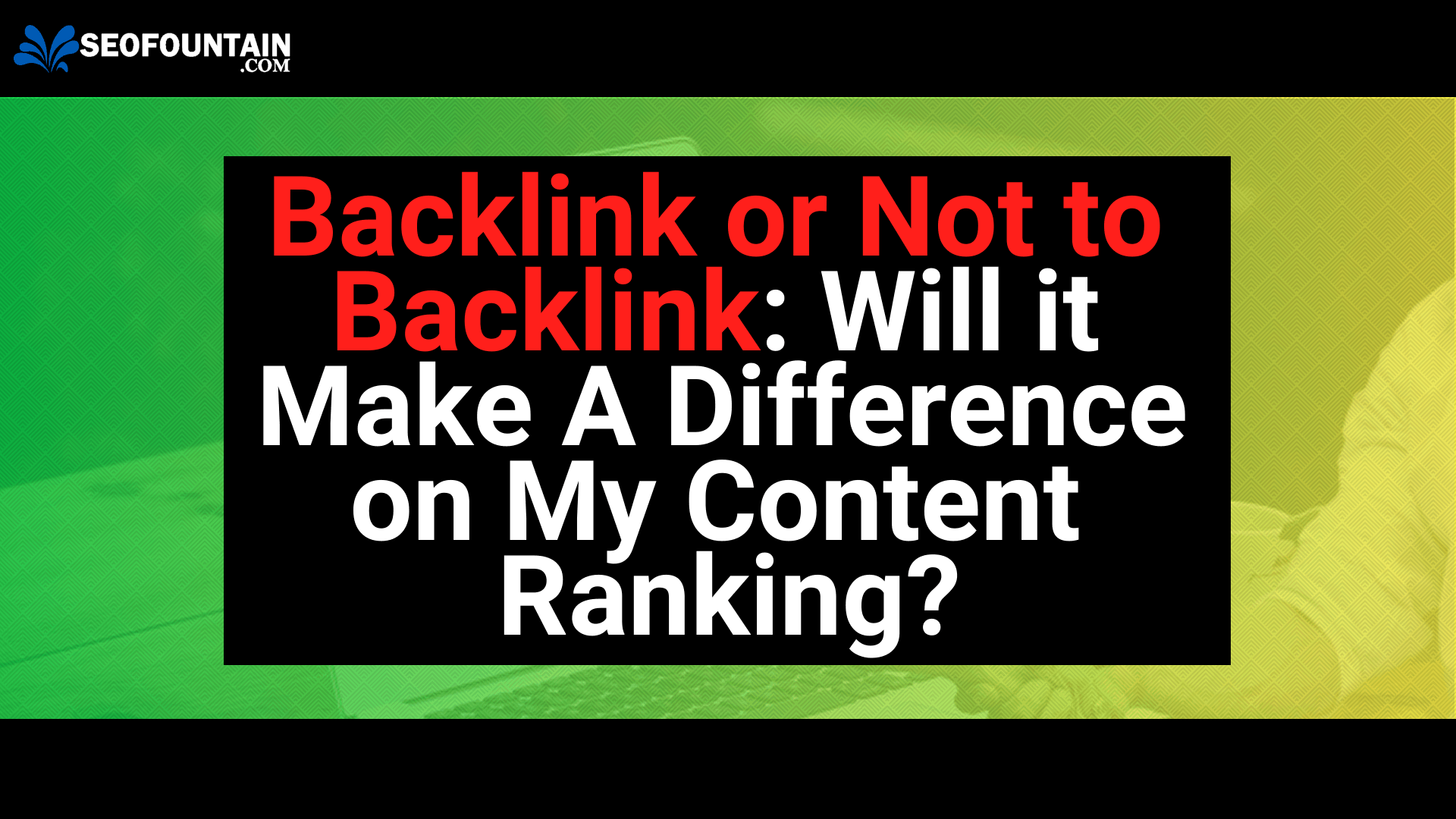To use backlinks or not to use backlinks. This is a common question among many in the SEO field. However, the question that you must ask yourself before you ask that question is, how successful do you want to be in SEO? Once you have a definitive answer to that question- then the answer to whether to build backlinks will become clear.
Can You Rank Content in SEO Without Link Building?
The answer to this question is yes, but that route comes with several caveats. Surprisingly, you can rank in Google without backlinks but with uncompetitive keywords. Simply put, backlinks play a very important signal to Google and other search engines when it comes to ranking. In a sense, backlinks serve as a “letter of recommendation” from one website to another.
The goal is that Google and other search engines go to bat for your content, and that is where building backlinks come into play. With that said, don’t take my word for it- a study done at SEMrush, a SaaS company based in Boston, found that backlinks aimed towards a specific domain do have a direct relationship with it’s ranking across search engines. Also, being that the amount of referring domains is one of Google’s factors of being ranked proves that building backlinks are essential to the success of your SEO. In general, there have been many studies done that show a clear and positive correlation between link-building and ranking higher with Google.
Domain Authority
To understand your SEO more is to, first understand your domain authority. Think of domain authority as an algorithmic score from 0-100 that is based on authoritative site backlinks in which the algorithm finds that link back to your site. The higher the number represents, the better you can rank. In simple terms, domain authority is a measurement of the overall strength of entire domains. Your site’s authority and how it is ranked is based on many factors such as traffic, the mobile experience, page load time and speed, user engagement, social signals, and linking root domains- just to name a few.
Simply put, links and link-building without a doubt move the needle on rankings- this goes for individual pages as well, which is described as page authority. As your domain authority and link profile grow, so will the potential to quickly rank for new articles. Also, as your domain authority rises, you can start to compete for those more competitive keywords with ease.
Generally, the homepage has the most backlinks aimed towards it. Therefore, the home page has the highest authority- but when you implement an internal linking strategy, that authority can be distributed across each connected page of that site. This strategy should be considered because it gives domain authority for the overall site. Domain authority and page authority, although different, still has an advantageous relationship; building more backlinks to an individual page will positively affect the domain authority score, which in turn will increase the individual page’s authority. So, what is the overall strength of your backlink profile, and where does your site rank in all this?
Domain Tiers
One of the best and free tools to test your domain’s authority is Moz’s Link Explorer. After all, they were the ones that developed the search engine ranking score system. With that said, it is important to know that Google does not use domain authority to determine search rankings. However, other metrics may be used in their algorithm that is similar to domain authority. Below is a general breakdown to help determine what your website’s authority means after you have determined your score.
- Tier 1- 0-30: Low authority websites that may prove finding content with good commercial value difficult.
- Tier 2- 31-60: Mid authority websites that are ranking for low competition topics but do have some commercial value.
- Tier 3- 61+: High authoritative website that can rank for very competitive keywords even without many backlinks.
So, where does your website fall in the rankings? If your domain authority is at the tier one or tier two levels, there is still some work to be done, but don’t get discouraged! To get some traction, you can still rank on the first page of Google with keywords with little to no competition even without link building. Keep in mind, without any competition, it is safe to assume that there will probably be little commercial value or relevance.
Tier three websites, although highly authoritative and can rank without many backlinks should also keep in mind that if they are not utilizing backlinks- they are selling themselves short to the competition that is. In this highly competitive SEO world, you need backlinks to keep up, especially if you intend to build a thriving and sustainable business.
Backlink Factors
Hopefully, this article has shown how important backlinks are to the success of your website and your business. The goal is not to sidestep backlinks and try to rank for low-competition topics- this strategy, although good to gain traction for a new or struggling website, is not good if you want to be competitive and rank for more relative, and meaningful topics. It is a fact that referring domains play a significate role in Google’s algorithm for ranking, but there are other important factors that you should also keep in mind.
- Overall Backlinks: Your website may have several backlinks from an identical domain, so this number matters. Generally, you can’t have too many backlinks, but- you can have too many negative These types of backlinks can include paid backlinks, backlinks flagged as harmful by Google, spammy backlinks, and too many from the same webpage to name a few.
- Overall Referring Domains: Simply put, the more high-quality domains linking back to your website, the better it is for your standing with Google and other search engines.
- Overall Follow Backlinks: These links count towards your ranking with Google- however, “No Follow” links do not count.
- Keyword in Anchor: Adding a targeted keyword in the anchor tag is a welcoming practice, but it does not hold a very high influence on your domain ranking unless it is a highly popular keyword.
- Overall Anchors: Over-optimized and repeated anchor text within the same article, blog, etc. may negatively impact your rankings due to duplicate content concerns.
- Trustworthiness of Linking Site: This can’t be said in any simpler terms. When it comes to SEO, research is a must. The goal is to avoid Google’s penalties as much as possible, so before you link to a website- you want to make sure that it is a trusted website with accurate information. Also, it is important to know that when it comes to referring webpages, the TrustRank is very important.
There are many theories out there about which specific backlink attributes influence organic search results, but as you can see, there are several factors to consider when it comes to backlinks.
Conclusion
Having good, engaging, relevant, and keyword-rich content will always be the leading factor when it comes to rankings. However, SEO is forever changing, and to keep up with the competition, link-building is a must! There is no question that backlinks will help you rank higher in Google. They even suggest it themselves on their “How Search Works” page. Moreover, the more “good” links that are aimed at your website and webpages will put you in good standings with Google. They will now view your webpages to be more authoritative, which will get them to begin to steer traffic your way. Like anything else with SEO, patience and consistency is a must, and building healthy backlinks will take time, but the reward at the end of the tunnel will be well worth it!






